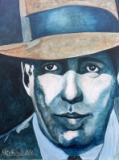Harlem Renaissance
In the early 1920's there was a movement called the "Negro" or "Harlem Renaissance". This resurgence of literature, knowledge, and the arts coming out of New York was powerful.

bell hooks is one of the most widely published black feminist scholars in the U.S. An outspoken cultural critic, educational theorist and professor of English, she is famous for her analyses of the politics of race, gender, class and culture, and for her attacks on what she calls the "white supremacist capitalist patriarchy." Using her pen name, bell hooks, she has written over thirty books and numerous scholarly and mainstream articles, appeared in several documentary films and participated in various public lectures. Primarily through a postmodern perspective, hooks has addressed race, class, and gender in education, art, history, sexuality, mass media and feminism.
Gloria Jean Watkins was born on September 25, 1952 in Hopkinsville, Kentucky. She grew up in a working class family with five sisters and one brother. Her father, Veodis Watkins, was a custodian and her mother, Rosa Bell Watkins, was a homemaker. Throughout her childhood, she was an avid reader.
Her early education took place in racially segregated public schools, and she wrote of great adversities when making the transition to an integrated school, where teachers and students were predominantly white. She graduated from Hopkinsville High School in Hopkinsville, Kentucky, earned her B.A. in English from Stanford University in 1973 and her M.A. in English from the University of Wisconsin–Madison in 1976. In 1983, after several years of teaching and writing, she completed her doctorate in the literature department from the University of California, Santa Cruz with a dissertation on author Toni Morrison.
Gloria Watson chose to use bell hooks as her pseudonym to honor both her grandmother, whose name she borrowed and her mother, as well as keeping her own identity separate from her writing.
She decided not to capitalize her first and last names in an attempt to place the focus on her work, rather than her name.
After high school, hooks accepted a scholarship to Stanford University, in California. Despite her full-time studies she began Ain't I a Woman at the age of nineteen. She also took a job as a telephone operator. Finding time for her writing was a challenge, but hooks found that the job offered her something she did not have in school at the time, a community of working-class, black women.
The author went through several drafts of the manuscript over the next six years before she had one that satisfied her. At first hooks had difficullty publishing her work, and eventually she was directed to her future publisher, South End Press, while giving a talk at a feminist bookstore in San Francisco. Once published in 1981, Ain't I a Woman became a central book in discussions of racism and sexism. Eleven years later, Publishers Weekly ranked it among the "twenty most influential women's books of the previous twenty years."
Since the publication of Ain’t I a Woman?, bell hooks has become eminent as a leftist and postmodern political thinker and cultural critic. She targets and appeals to a broad audience by presenting her work in a variety of media using various writing and speaking styles. As well as having written books, she has published in numerous scholarly and mainstream magazines, lectures at widely accessible venues, and appears in various documentaries.
She is frequently cited by feminists as having provided the best solution to the difficulty of defining something as diverse as "feminism", addressing the problem that if feminism can mean everything, it means nothing. She asserts an answer to the question "what is feminism?" that she says is "rooted in neither fear nor fantasy, 'Feminism is a movement to end sexism, sexist exploitation and oppression'"
bell hooks has held positions as Professor of African and African-American Studies and English at Yale University, Associate Professor of Women’s Studies and American Literature at Oberlin College in Oberlin, Ohio, and as Distinguished Lecturer of English Literature at the City College of New York.
A commencement speech hooks gave in 2002 at Southwestern University was considered controversial. Eschewing the congratulatory mode of traditional commencement speeches, she spoke of government-sanctioned violence and oppression, and admonished students who went with the flow. The speech was booed by many in the audience, though "several graduates passed over the provost to shake her hand or give her a hug."
In 2004 bell hooks joined forces with Berea College in Berea, Kentucky as Distinguished Professor in Residence, where she participated in a weekly feminist discussion group, "Monday Night Feminism", a luncheon lecture series, "Peanut Butter and Gender" and a seminar, "Building Beloved Community: The Practice of Impartial Love".
Don't miss a single page. Find everything you need on our complete sitemap directory.
Listen or read the top speeches from African Americans. Read more
Read about the great African Americans who fought in wars. Read more
African Americans invented many of the things we use today. Read more
Thin jazz, think art, think of great actors and find them here. Read more
Follow the history of Black Americans from slave ships to the presidency. Read more
Olympic winners, MVPS of every sport, and people who broke the color barrier. Read more
These men and women risked and sometimes lost their life to fight for the cause. Read more
Meet the people who worked to change the system from the inside. Read more

Visit my RedBubble page and use Michael Arnold Art to create greeting cards, T-shirts, mugs, and more.

The variety and impressive numbers of mammals, birds and marine wildlife in Alaska draw visitors from all over the world. For some travelers, Alaska is wilderness, at least compared to what they may know from back home. The pristine wilderness of Alaska is, perhaps, the last vestige of thriving populations of North American wildlife. Where else can you see polar bears, bald eagles, blue and humpbacked whales, gray wolves, grizzly bears, orcas, lynx, moose, and hundreds of other rare and endangered species in their original and undisturbed natural habitats?

Enjoy our website filled with original signed acrylic paintings by award winning Artist Michael Arnold. Located in Citrus County Florida, Michael Arnold is a the editor at the Citrus County Chronicle. When he's not busy being an editor, he is an avid artist who enjoys painting in a variety of styles. We hope you take the time to click on each image to see a larger view and to learn what the artist, Michael Arnold has to say about his paintings.

As dog owners and people who care deeply for animals and wildlife, we wanted our Dog Encyclopedia to be a website that could empower pet owners to create the most positive, loving environment for their dogs. Dog Encyclopedia realizes that owning a dog is like adding a new member to your family.

Floridian Nature has everything your are looking for in Florida nature. The wildlife of Florida is rich and varied, yet most of us are familiar with only a dozen or so species: the "well known endangered species such as manatees and panthers; those, like raccoons and squirrels, that have adapted to urban environments; the frightening alligators and black bears; and those like the armadillo who can't seem to cross the road. Yet they are just a few of the many animal species found in Florida.
